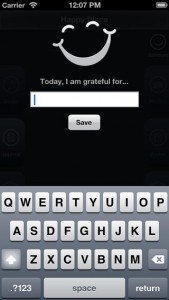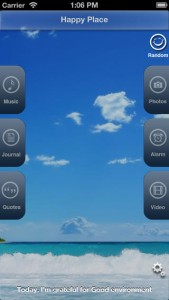Your Happy Place App Helps Fight Depression
An app, called HappyPlace, helps you fight depression with your smartphone. Available on itunes, HappyPlace manipulates a person’s perception of ambiguous facial expressions. If apps can monitor your daily steps taken, take your pulse, or measure your exercise levels, why not have an app to treat depression?
Our brains process everything we see. Sometimes, the facial expressions of others are ambiguous. Is she happy or sad? ls he frowning because he’s angry or is he focused on solving a problem? Your perception of an ambiguous expression is influenced by how you feel that day and how biased you are towards certain expressions. If you think a frown means anger, then you’ll assume the person is angry even if he is really just trying to solve a math problem.
Think about when you walk down a street and see a friend. If the friend has a blank facial expression, on a good day you won’t think anything about it. On a bad day, you’ll interpret the blank face in a completely different way. You’ll think the person is indifferent or doesn’t care about you.
Depression makes you feel horrible and think negatively about everything. Your bias is to not see joy or love or anything good because you don’t feel happy or good about anything. So an ambiguous expression will make you project your anger, pain, and sadness onto that person. You’ll think something negative before you think about something positive. You’ll think your boyfriend is angry when he’s not. Next thing you know, your boyfriend who you accused of being angry does get angry because you’re telling him he’s angry. It’s a vicious cycle in depression and one that drives loved ones away from you.
Your HappyPlace App
The idea behind the HappyPlace app is that your misinterpretation of facial expressions can be corrected by using feedback to teach you to think first about positivity instead of negativity. HappyPlace wants to replace the thought that your boyfriend is angry with the thought that your boyfriend is happy.
Here’s how HappyPlace works. HappyPlace shows you faces with expressions that fall along a continuum from happy to sad. The faces appear in random order, and you’re forced to say whether each one is happy or sad, even for the ambiguous ones. The app assesses your personal boundaries of sad and happy. Then you’re shown some more faces. This time HappyPlace gives you feedback on your answer. The faces that are just on the sad side of your personal boundary are classified ‘happy’ by HappyPlace, so when you say they’re ‘sad’, the app tells you you’re wrong.
This feedback seems to shift a person’s boundary point towards positivity, and also seems to affect mood. Plus it cuts down on the number of times you have a pointless and unnecessary argument with your boyfriend about whether he’s angry or happy.
HappyPlace is cheap to use and easy to upload. Apps like HappyPlace is where research in depression is heading. Having apps that help you when you don’t want to visit a doctor but feel crappy is something you can use in addition to medications and therapy.
HappyPlace is available from itunes for $.99. HappyPlace lets you store things that make you happy, including journal entries. There’s even a ‘Today I Am Grateful For…’ and you fill in the blank.
Twitter: @tereziafarkas #depression #HappyPlace #newtech
* Click here to find out more about Terezia Farkas and Depression Help Free.


